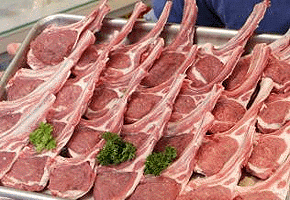
By Allan Barber
 The exchange rate and uncertainty in the Eurozone remain the biggest negatives for red meat exports in the short term, but the outlook is still positive heading into next year.
The exchange rate and uncertainty in the Eurozone remain the biggest negatives for red meat exports in the short term, but the outlook is still positive heading into next year.
It’s very hard to pick what will happen in Europe which will inevitably have a large impact on lamb prices for the foreseeable future.
Southern Europe and the UK are technically in recession and are unlikely to improve much, at least until the ECB manages to sort out how it will cope with the trials of Greece, Spain and others.
But the longer term prospects for lamb are still favourable, once inventories from the season just completed have moved through the trade.
The extremely good growing season also had the effect of creating the heaviest lamb weights ever which is not necessarily a good thing; the law of averages says this won’t happen next season.
Therefore consumer confidence and ability to spend will be the key factor for the European market, including the UK, which takes 41% of our sheepmeat exports. This proportion has reduced in recent years with exports to North Asia (24%) and North America (11%) increasing in significance.
The call to exporters to diversify away from the traditional markets appears to be working, although it has always been possible to sell product elsewhere, just not at the best price. North Asia, particularly China, has offered an increasingly profitable option in recent years.
Beef prospects remain stronger than sheepmeat, both because North America, as the main market, appears better economically than Europe, and the fast food market segment which takes most of our beef is less price sensitive.
In addition the USA is currently experiencing severe drought which is having a serious impact on domestic beef supplies; as a result New Zealand beef will be in strong demand.
Fortunately cull dairy cows which are the main source of lean beef for blending into hamburger beef will be in plentiful supply next year. 16% fewer cows have gone to the works this season, because good feed supply has seen cows retained for another year. Prices which have been firm this year will continue to be firm simply because of supply and demand.
Beef & Lamb New Zealand’s Meat and Wool Price Outlook for 2012/2013 forecasts a reduction of 8% for lamb on the present season, equivalent to $10 per lamb, and 7% reduction for mutton. Although this seems substantial, it is even more striking when compared with the peak price of $156.70 per lamb in September. This of course was never sustainable and related to scarce supply for the premium Christmas trade.
Beef prices are forecast to be 2% higher than the current year, equivalent to about 9 cents per kilo, mainly due to stronger US prices, while other markets are expected to remain steady. The returns for co-products are forecast to remain steady as well.
Exchange rates are the hardest to predict, as demonstrated by the fact that the Euro has already weakened by 5% since Beef & Lamb’s June estimate. However exchange rates will be what they will be and, as commodity exporters, New Zealand will have no ability to achieve compensating price increases.
The most difficult challenge for New Zealand exporters remains what it has always been: to change progressively from being price takers to being able market products in a form that can command a price premium.
That is a whole different question.
--------------------------------------------
Allan Barber is a commentator on agribusiness, especially the meat industry, and lives in the Matakana Wine Country where he runs a boutique B&B with his wife. You can contact him by email at allan@barberstrategic.co.nz or through his blog at http://allanbarber.wordpress.com/.

We welcome your comments below. If you are not already registered, please register to comment
Remember we welcome robust, respectful and insightful debate. We don't welcome abusive or defamatory comments and will de-register those repeatedly making such comments. Our current comment policy is here.